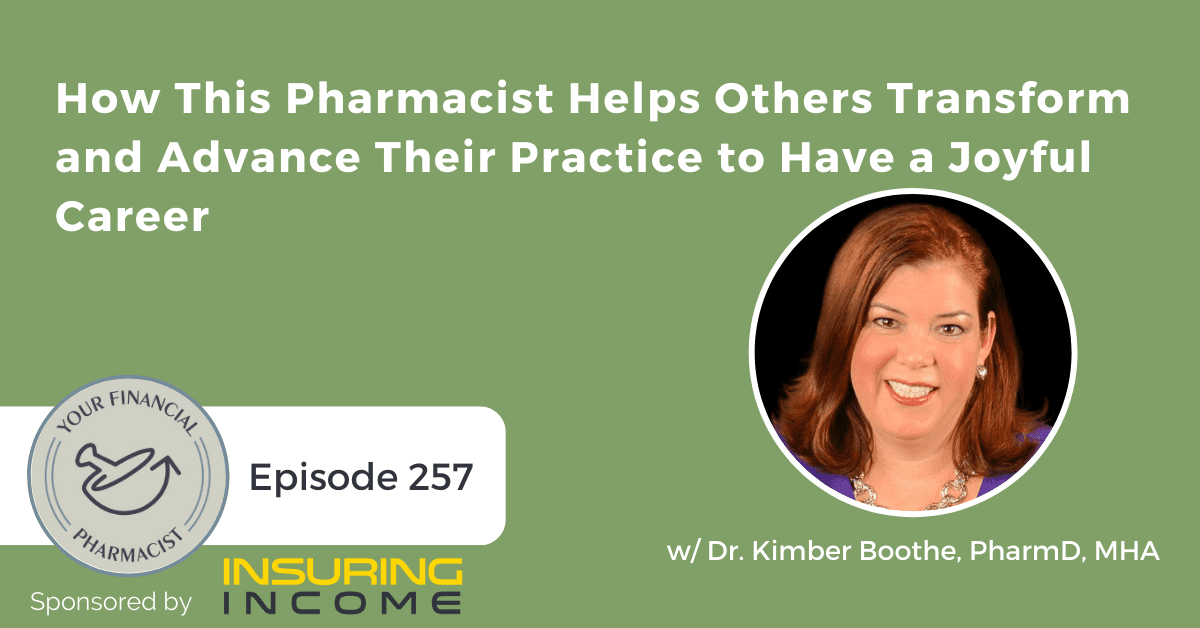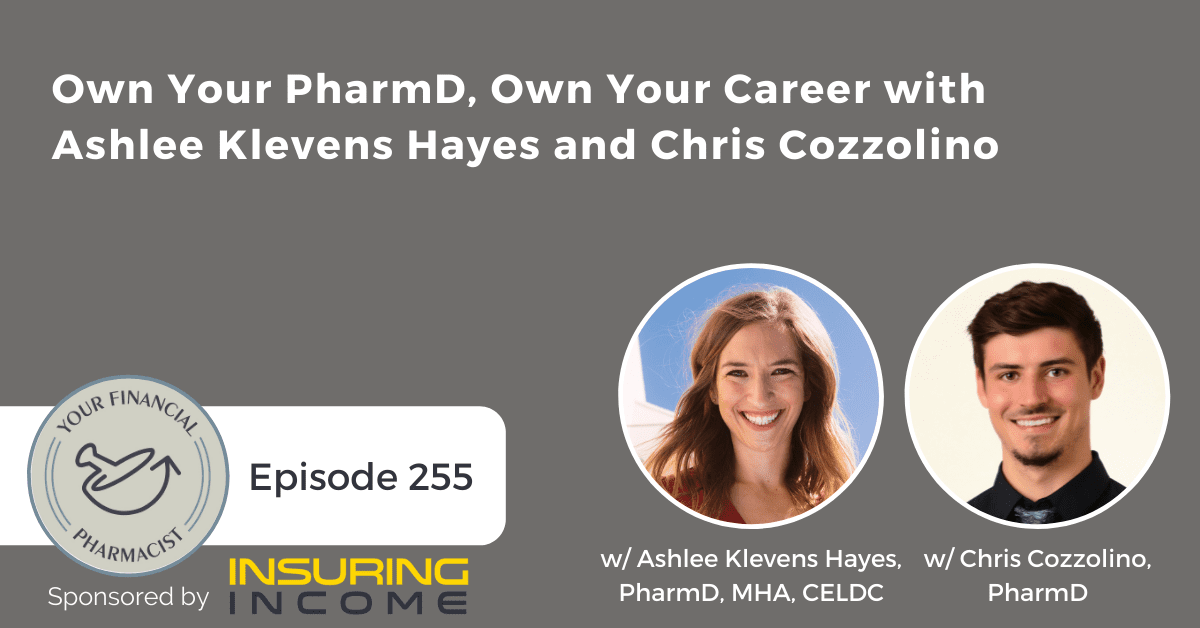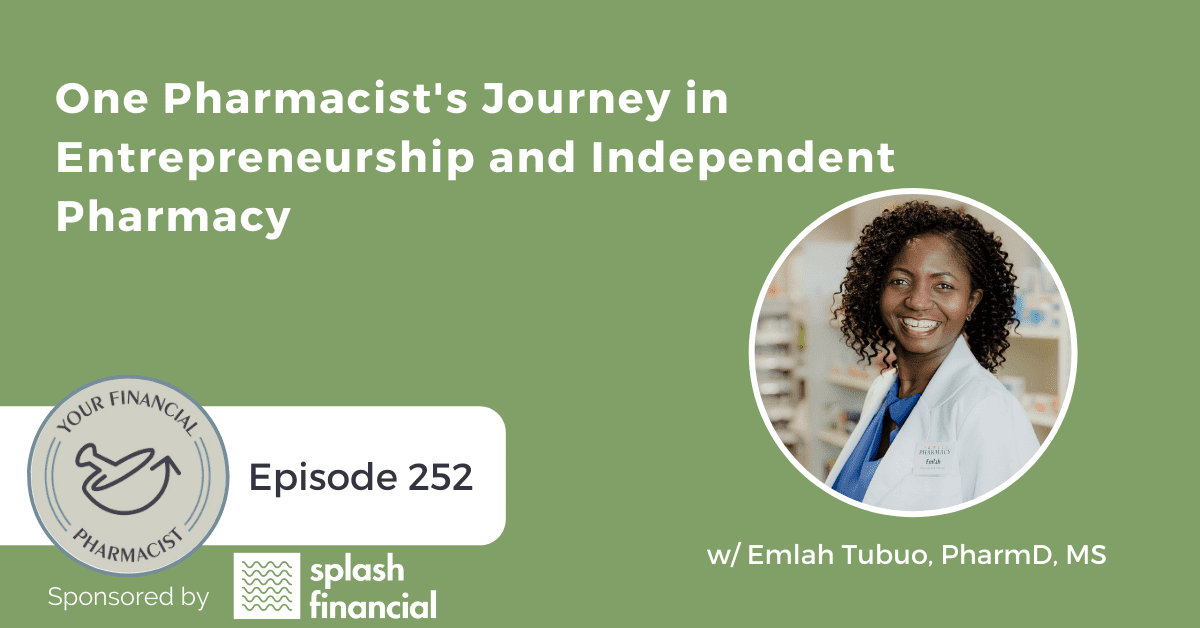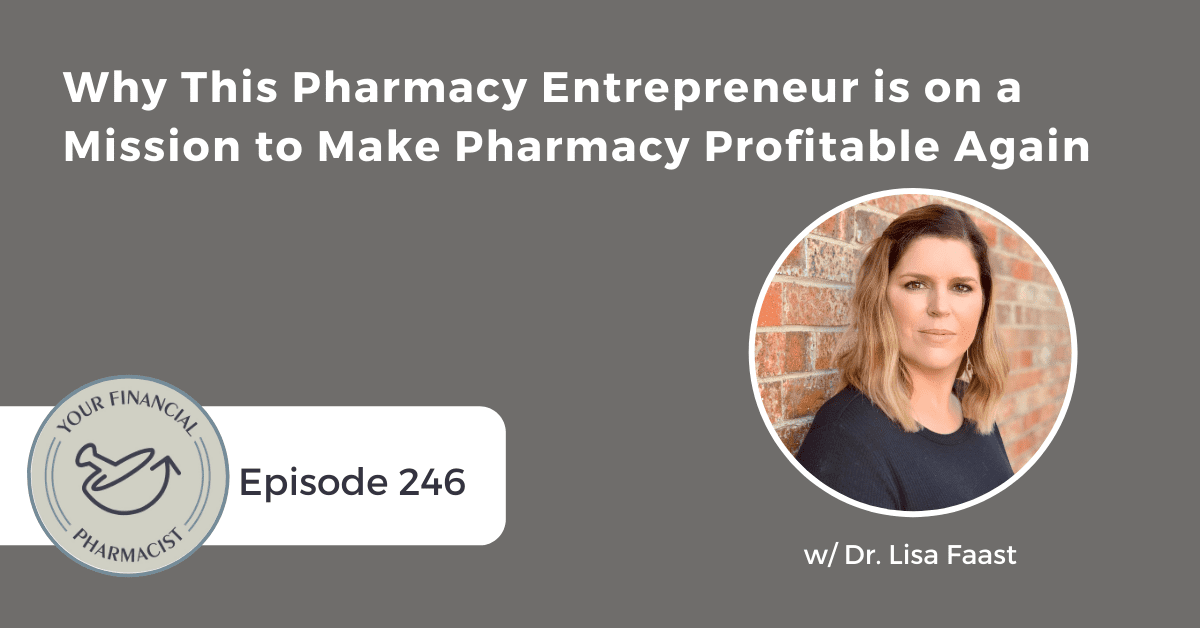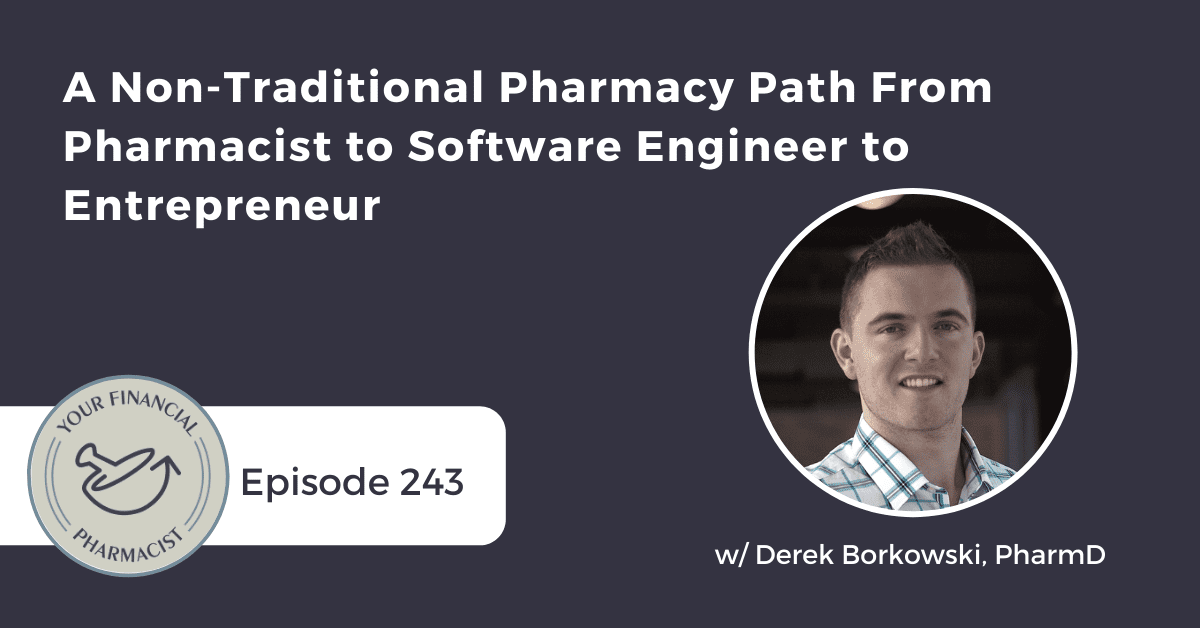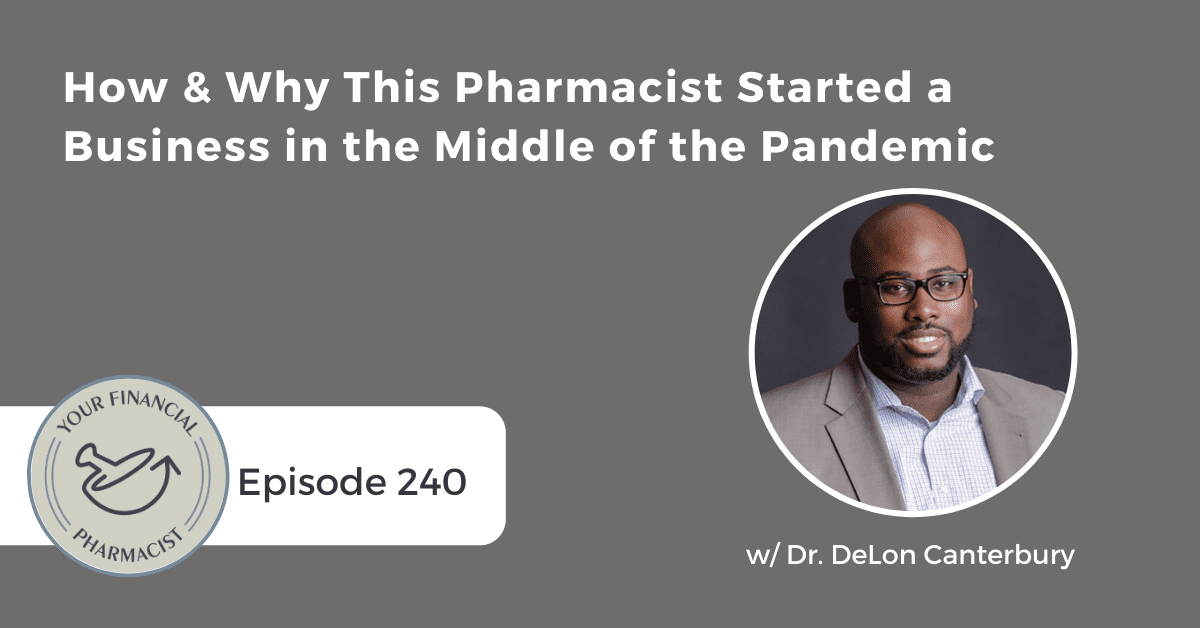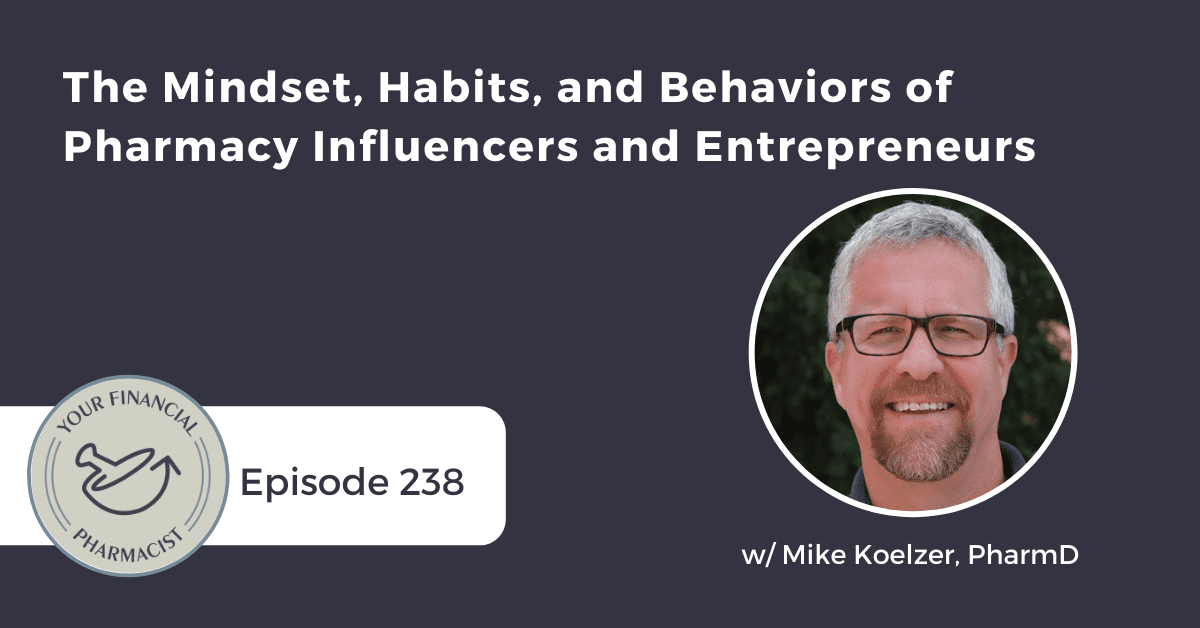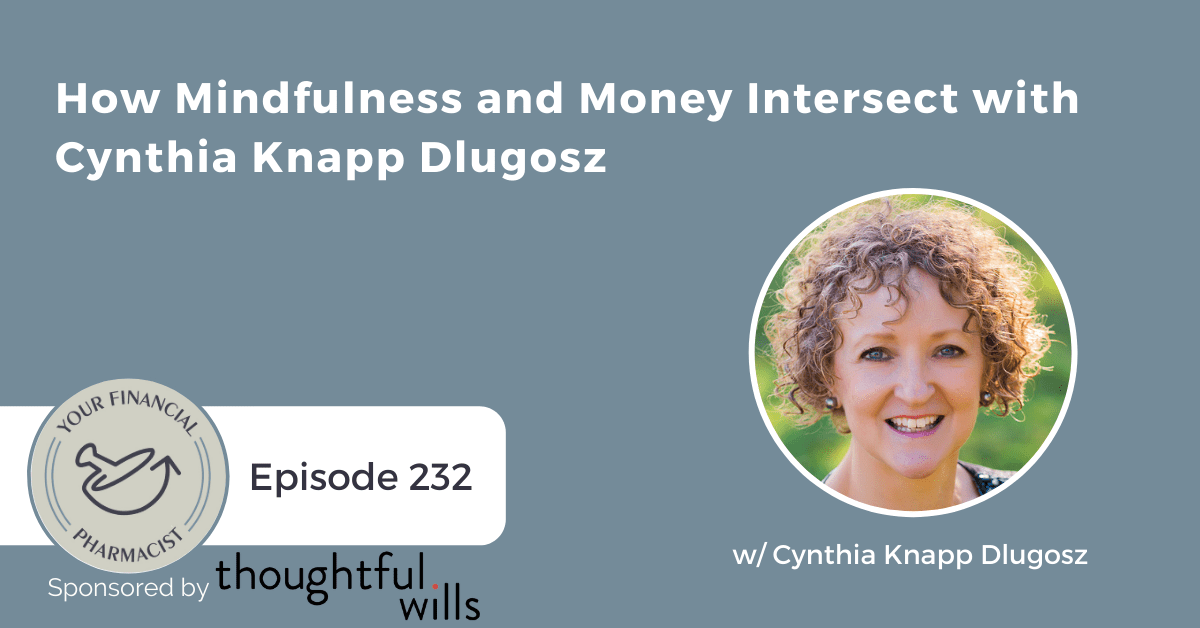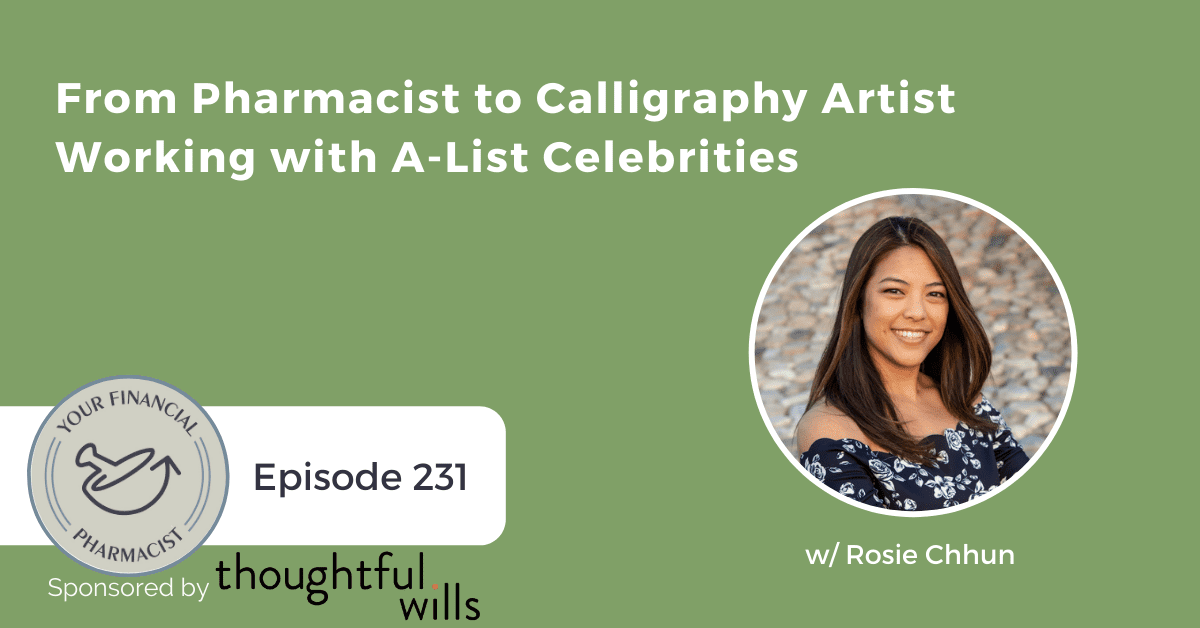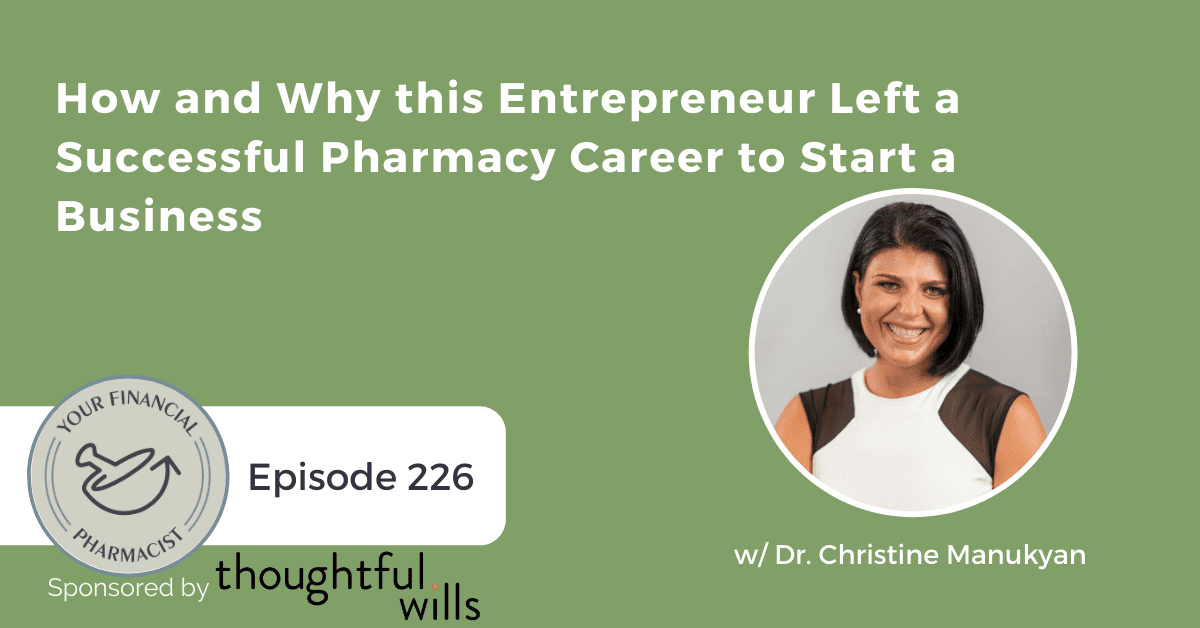How This Pharmacist Helps Others Transform and Advance Their Practice to Have a Joyful Career
In today’s episode, sponsored by Insuring Income, Dr. Kimber Boothe, PharmD, MHA talks about her career in health systems and the pharmaceutical industry, why she founded the Kimber Boothe Group, how she has monetized her expertise, and the lessons she’s learned from publishing her second book, ‘Pharmfluencers: The Inspiring Stories of Pharmacy Entrepreneurs.’
About Today’s Guest
Dr. Kimber Boothe, PharmD, MHA, is a pharmacist, healthcare leader, and entrepreneur with decades of experience in health systems and the pharmaceutical industry. Kimber is the founder and CEO of the Kimber Boothe Group where she helps pharmacists transform and advance practice to have a joyful engaging career.
She serves by providing coaching, consulting, and courses on:
- Leadership & Career Development
- Pharmacy Strategy & Innovation/Intrapreneurship
- Pharmacy Entrepreneurship
She calls herself a Connector and a Pharmovator® and is the creator and author of several programs and books to guide pharmacists to success. CONNECTOR CORE™ is a program on the Connector Framework™ – Connectorability™, Connector Alignment™, Connector Foundation™, and Connector LIFE™. PHARMOVATION® is a course and system to Accelerate Your Pharmacy Career, Advocate for resources & Advance Pharmacy Practice, and PHARMFLUENCER™ is to Influence, Multiply, and Impact Pharmacy through Entrepreneurship.
Kimber previously led the pharmacy services for a four-hospital community health system where she drove innovative strategy for the pharmacy enterprise as the Chief Pharmacy Officer. She was also the Director of Clinical Pharmacy Services at Yale New Haven Health. She is a graduate of the University of Connecticut School of Pharmacy and Medical University of South Carolina College of Pharmacy, University of Phoenix Masters in Health Administration program, and completed residency training at Virginia Commonwealth University Medical College of Virginia Hospitals.
She is passionate about spending time on the right things to develop others and deliver strategic, focused results. Her motto is Pharmacy Can do More with More™ and her goal is to support the addition of 100 new health system pharmacy positions annually.
She is the recipient of the Connecticut Society of Health System Pharmacists Meritorious Achievement Award and her prior organization has been recognized with the Kentucky Society of Health System Pharmacists Innovative Health-System Pharmacy Practice Award.
Episode Summary
There are more methods to monetize your knowledge and expertise in the pharmacy industry than you think. All you have to do is pick one. In this episode, discussing the various options and sharing her personal pharmacy path from clinical roles to leadership and consulting is Dr. Kimber Boothe. Not only is Dr. Boothe the author of two books, Pharmovation: Advocate for Resources, Advance Pharmacy Practice, & Accelerate Your Pharmacy Career and Pharmfluencers: The Inspiring Stories of Pharmacy Entrepreneurs, but she’s also the founder of the Kimber Boothe Group, where she guides pharmacists towards a joyful, engaging, and lucrative career. Listeners will hear Dr. Boothe break down the differences between intrapreneurship and entrepreneurship and her experience with each. We discover the purpose behind her mission, learn about her personal growth goals as she moves from a solopreneur to filling staff positions and hear her thoughts on the importance of intentional career development. We also delve into the power of mindset with Dr. Boothe, who shares some actionable tips for shaping a positive mindset. Dr. Boothe also takes a moment to discuss the levels of relationships, types of coaching available to you as a pharmacist, and why she believes coaching is so important.
Key Points From This Episode
- Dr. Boothe’s career path in pharmacy, from clinical roles to leadership and consulting.
- Defining intrapreneurship versus entrepreneurship.
- The pros of allowing for intrapreneurship within an organization.
- Why Dr. Boothe believes pharmacy can do more with more.
- The genesis of The Kimber Boothe Group and the problems it aims to solve.
- Dr. Boothe’s growth goals.
- The importance of being intentional about career development.
- The purpose of Dr. Boothe’s book, Pharmfluencers, and the information it contains.
- Ways to monetize your knowledge and expertise in the pharmacy industry.
- The power of mindset and tips for shaping a positive mindset.
- The four levels of relationships and why Dr. Boothe believes having a coach is critical.
- Dr. Boothe’s transition from being a solopreneur to hiring and filling positions.
Highlights
“Intrapreneurship is the opportunity to be innovative at work within the safety and support of an organization. It’s basically that ability to do innovative things, but within that support where you have additional financial support. You don’t have the risk of having your own business.” — Kimber Boothe, PharmD, MHA [0:04:47]
“I’m really pro pharmacy. I want to advance the profession, whether it is through intrapreneurship or with entrepreneurs.” — Kimber Boothe, PharmD, MHA [0:27:51]
“Once you read [Pharmafluencers], you’re inspired. You can think through and find your ikigai, which is your passion and purpose, and tie that to something that can be monetized.” — Kimber Boothe, PharmD, MHA [0:31:59]
“Destiny is not a matter of chance. It is a matter of choice. There’s not a thing to be waited for. It is a thing to be achieved.” — Kimber Boothe, PharmD, MHA [0:37:16]
Links Mentioned in Today’s Episode
- KimberBoothe.com
- Pharmfluencers: The Inspiring Stories of Pharmacy Entrepreneurs by Kimber Boothe
- YFP Planning: Financial Planning for Pharmacists
- Schedule a free Discovery Call with YFP Planning
- Insuring Income: Get Quotes and Apply for Term Life and Disability Insurance
- Medipreneurs
- Pharmovation: Advocate for Resources, Advance Pharmacy Practice, & Accelerate Your Pharmacy Career by Kimber Boothe
- ActionCOACH Business Coaching
- Connect with Kimber Boothe on LinkedIn
- Your Financial Pharmacist Disclaimer and Disclosures
Episode Transcript
[INTRODUCTION]
[00:00:00] TU: Hey, everybody. Tim Ulbrich here. Thank you for listening to the YFP podcast, where each week we strive to inspire and encourage you on your path towards achieving financial freedom. This week I had the chance to welcome pharmacy leader, influencer, and entrepreneur Dr. Kimber Boothe, to talk about her career in health systems in the pharmaceutical industry, why she founded the Kimber Boothe Group, where she helps pharmacists transform and advance practice to have a joyful, engaging career, how she has been able to monetize her expertise and the lessons that she learned from publishing her second book, Pharmfluencer: The Inspiring Stories of Pharmacy Entrepreneurs.
Before we hear from today’s sponsor and then jump into the show, I recognize that many listeners may not be aware of what the team at YFP Planning does in working one-on-one with more than 240 households in 40-plus states. YFP Planning offers fee-only high-touch financial planning that is customized for the pharmacy professional. If you’re interested in learning more about how working one-on-one with a certified financial planner may help you achieve your financial goals, you can book a free discovery call at yfpplanning.com. Whether or not YFP Planning, financial planning services are a good fit for you, know that we appreciate your support of this podcast and our mission to help pharmacies achieve financial freedom. Okay, let’s hear from today’s sponsor, and then we’ll jump into my interview with Kimber Boothe.
This week’s podcast episode is brought to you by Insuring Income. Insuring Income is your source for all things term, life insurance, and Own Occupation Disability Insurance. Insuring Income has a relationship with America’s top-rated Term life insurance and disability insurance company, so pharmacists like you can easily find the best solutions for your personal situation. To better serve you. Insuring Income reviews all applicable carriers in the marketplace for your desired coverage, support clients in all 50 states, and makes sure all of your questions get answered.
To get quotes and apply for Term life or disability insurance, see sample contracts from disability carriers or learn more about these topics. Visit insuringincome.com/yourfinancialpharmacist. Again that’s insuringincome.com/yourfinancialpharmacist.
[INTERVIEW]
[00:02:10] TU: Kimber. Welcome to the show.
[00:02:12] KB: Thank you, Tim. It’s great to be here.
[00:02:14] TU: So excited to have the opportunity to talk with you. Before we do a deep dive into the work that you’re doing today and much of your entrepreneurial journey as of late, talk to us about the path of your work in the pharmacy. Where that began, your interest in the profession as well as your career journey as a clinical specialist in the industry, and then as a health system leader?
[00:02:35] KB: Thank you, Tim. Well, I just, first of all, want to say that I do love our profession of pharmacy and I think, I want to thank you for everything you’re doing to support our profession’s financial health and support our innovation. I have had a wonderful career in pharmacy, starting mostly in hospitals and health systems and various clinical roles and as a cardiology specialist, moving up to leadership roles, ultimately into being assistant director, chief pharmacy officer for Community Health System, as well as being a director, system director of clinical services for an academic health system.
I also did spend ten years in the Pharma industry, so I had that experience, which I actually do owe a lot of my innovation and business savvy to the development I had in the Pharma industry where I did various roles in the medical affairs department. But was definitely drawn back to health systems, to what I referred to these days as my entrepreneurship activities, where I was promoting innovative practice, and bold strategic planning to advance pharmacy within an organization such as health systems.
[00:03:46] TU: Kim, I want to dive a little bit deeper on that, because I think there’s a lot of glorification that’s going on in entrepreneurship right now. We use that term a lot, and I think sometimes that can be interpreted as being synonymous with your own business or starting your own business, but entrepreneurship is a term where we’re starting to see grow, and I’m grateful for that. I think in the profession that term, I actually like a little bit more because I think it’s something that everyone can resonate with regardless of their role and the impact that they can have on the profession. So define for a moment what you mean by entrepreneurship and obviously, I think that’s something that we’re seeing. Lots of folks have opportunities within the profession that could be independent of owning their own business, right?
[00:04:26] KB: Absolutely. At the end of the day, entrepreneurship is wonderful. I know we’ll probably talk more about that as well, later on in this conversation, as I am now, what I like to call a full-time entrepreneur. But at the end of the day, most people are not going to be entrepreneurs, when you look at our total profession, 350,000 pharmacists in the US. intrapreneurship is that opportunity to be innovative at work within the safety and support of an organization. It is referred sometimes to as an entrepreneur on the job, or an entrepreneur in an organization. It’s basically that ability to do innovative things, but within that support where you have additional financial support, you don’t have the risk of having your own business.
That company is taking the risk, but there’s definitely some challenges because I know there are some organizations that are not open to these innovative ideas and you may not be able to implement something that you’re trying to do. But definitely the most successful organizations out there, whether they’re in health care or external to health care, those that allow for intrapreneurship’ to occur within their organization are more successful. Allowing the employees, team members to come up with ideas, allowing them time to work on those ideas while in the organization, helps their bottom line, helps them to be more successful, and ultimately to create more revenue for the company.
[00:06:00] TU: Yeah. I think that’s a great point. I mean, yes, it increases the bottom line increases of revenue, hopefully, pushes the innovation. I would argue also for the employee having that autonomy, having that space for creativity also probably ties to things like satisfaction in the workplace and retention and obviously can have a positive impact for employers as well, if they’re able to create that space to allow for entrepreneurship. Kimber, your motto is, “Pharmacy can do more with more with more.” What do you mean by that?
[00:06:30] KB: Well, I have to admit that definitely is my motto. Well, there is definitely times that we need to find efficiencies. I get very upset when I hear that phrase, do more with less. Yes, again, there’s times we can find efficiencies, use technology and be able to do more, but what I’ve seen in our profession is that we are underutilized and under-resourced for all of the massive amounts of unmet medication and health-related needs out there.
When I actually return to health systems after my ten years in PharmOn, I realized that the health system I was working at had grown immensely in terms of the number of patients, the number of services being provided, but the pharmacy team had really not grown in the same ratio. What I recognize is that we could be doing so much more, but we only had enough resources to focus on the most acute problems and whether that was on the acute care hospital side or even in the amateurish space where we had very few ambulatory pharmacists helping patients on an ongoing basis.
I came up with that motto and it’s definitely stuck with me and it’s really my mission and really why I left my intrapreneurship role to do entrepreneurship because my goal is to help create 100 new positions every year in pharmacy. When I think about some of the concerns that there is too many pharmacy students graduating, or when I look at the data and you really look at the unmet needs of complex medications, aging populations, clinician, physician shortages, I see a huge need for pharmacists.
Well, I don’t know the exact number of pharmacists we need. We definitely need more pharmacists practicing, but in different places than we are today, and also with different and better reimbursement models that value our overall benefit to health care and what I often referred to as the quadruple aim that we can help with improving the quality of care, we can improve the patient experience, we can improve provider satisfaction, and ultimately reduce costs by having more pharmacy team members.
The last thing I’ll say about it is, I often do the reason I say pharmacy can do more, not just pharmacists, is I definitely see a huge value of our pharmacy technician team members and have definitely advocate in for increasing their roles and as part of a true career for them, as well as, of course, integrating our students and optimizing more roles or creating more resonant positions. That’s why I often say pharmacy can do more with more, not just pharmacists.
[00:09:21] TU: Yeah. I love Kimber, your vision and an abundance mindset of creating new positions, right? 100 new positions in pharmacy each year. I wish we would see that adoption at a greater level among our national organizations and others because I think it really gets out of the conversation of, we only have so many jobs in this many graduates. What do we do? How do we increase the pie, right? How do we increase the pie and the opportunities that are out there? Which require, what we were just talking about a moment ago, that culture and spirit of intrapreneurship and entrepreneurship. So talk to us about the genesis of The Kimber Boothe Group. Your business and we’ll talk more about products and services here in a moment. But The Kimber Boothe Group, what problems or challenges did you face? What were you trying to remedy with this business?
[00:10:04] KB: Well, it’s interesting. When I first started the business really eight years ago, definitely as a side hustle, maybe many of your listeners are doing or considering doing. So at the time, actually when I started, I was actually still in Pharma at that time, and definitely, I had had multiple business ideas that all ended up in a file cabinet. So there was definitely a bug that I had around entrepreneurship but hadn’t found the right fit for me until I actually came across this thought leader, influencer model of an expert where it took away some of what I saw as barriers to a business like physical space products. It became about, what are you good at? What do people come to you for? What are you the expert in? How can you monetize that knowledge by sharing it with other people and helping them to grow, and becoming that multiplier to spread?
When I came across this expert’s model, that’s when I decided actually to create my business. I came up with a list of the things again that people naturally came to me for, the things that I was drawn to learning more about. It was definitely a lot about strategic planning, project management, and career development were the three main areas, both career development in terms of your professional development, but also being more assertive about your career trajectory and path. So that’s how I started. It was very general. I started to do some things on the side, some coaching.
I always to refer back to my first coaching client was an opera-singing soccer mom who just wanted some help to get back into opera singing and into the stage where she had to focus on her family for so long. We worked through that and she got on stage. So she was my first coaching client. From there it was a few years later that I actually went to the Medipreneurs Conference, which is an event that a few pharmacists had created, Anna Garrett, Sue Paul and Michelle Fritsch created that event. When I went to that event, I realized there that my passion is pharmacy, and that is where I had had definitely some success with doing some intrapreneurship business plans, justifying more positions.
I was being asked to speak by various organizations, conferences. I said, “Why am I trying to do this business very broad? I should be niching down or focusing my target to pharmacy.” Because I don’t mind helping soccer moms and things like that, but really, my passion is pharmacy. What I really wanted to do and connect those dots together was really focusing on helping the pharmacy profession to advance through sharing, again, similar topics. Strategic planning, project management, and career development were definitely a big part of that.
Back then, is when I created my Pharmovation course, which then turned into my Pharmovation book and the pharmovation consulting that I do for health systems which is where I spend most of my time these days, is actually helping organizations to write strategic plans, write those business plans that actually justify those additional positions.
[00:13:33] TU: For folks that are interested in learning more about what Kimber had shared of the influencer expert business model. She talks about it in her book, Pharmfluencers: The Inspiring Stories of Pharmacy Entrepreneurs. So more information there, I think that’s a great way for pharmacists to think about, especially what Kimber, or when I think about your career journey and the expertise that you have. I suspect many of the relationships in the network that you have, it makes a whole lot of sense that you’re doing some of that consulting.
If I heard you correctly you’re doing both on the business to business side, you’re consulting with health systems and organizations, helping them on a strategy leadership level, but then also you have a suite of services that are really on the business to consumer the B2C side for the individual being the courses, the coaching and the books. Is that correct?
[00:14:19] KB: Exactly, yes. I have what I call my product matrix of what I’m trying to support people with. Yeah, there’s definitely the consulting arm that focuses on the businesses themselves. I’m usually paid by director of pharmacy, usually. Then others, whether it’s individual coaching online courses or membership programs where people have opportunities for all of us to connect in a smaller group coaching atmosphere, both on the entrepreneurship side and the entrepreneurship side.
[00:14:53] TU: Could you break down a little bit further, Kim? You said you spent a vast majority of your time in consulting with the health system, roughly speaking certainly not share individual numbers, but roughly speaking on time spent or revenue of the business, if we think about this as a pie chart with your consulting to organizations, and then some of the coaching and the coursework that you’re doing with individuals or smaller groups as well as the books or other products. How would you break that down in terms of the different products and services that are within your business?
[00:15:21] KB: Yeah. That’s a very good question in terms of that breakdown and what it is now and what I wanted to be, I’ll share here. So right now it is more 90% of my time and 90% of my revenue is coming from consulting. That is that work and the other 10% is coming from the membership’s one-on-one coaching and other things like the summit programs that I’ve done. So that 90/10 a ratio, I’m definitely wanting to change that a little bit. I’m doing things like I have a full-time assistant and we’re trying to grow the online business through the membership basically, just because my time is limited.
If I want to be able to have more impact and reach more people, it’s not going to be through my one-on-one consulting. So I think the goal would be to grow that about to 40% of the business, 50 to 60% maintaining on the consulting side because I still think that’s vital for me. Having that integrated involvement with organizations is really helpful for me to grow and for me to really have the biggest impact, but I also know again, to reach more people and to get other people to write their own business plans so that we can create even more than 100 positions a year is definitely how I want to grow.
Again, moving towards more of a, almost a 50/50, but in this current year, my goal is to get to at least 80/20. So each year I have a goal to move that needle about 10%. Again, some of that is through growing my group membership that I have called the Connector Leadership Circle. Again that I can help more people at once and I can through, one-on-one coaching conversations or one to business consulting. I will share my other goal with growing is to add to my team. So I’m definitely talking with folks about doing some consulting with me, so I could potentially take on more consulting clients if I had a team. Right now it is just a team of one, right now.
While I have been asked by other consulting companies to become part of their firms, I’ve chosen to stay on my own, because of the flexibility, so I could focus on what I want with this ratio of services. Again, I recognize that organizations do need help. When I’m full on my consulting or my coaching clients and I can’t take anymore, well, how can I serve more? That would be adding to my team and them coming under the Kimber Boothe Group to do the consulting with me and as well as potentially some additional coaches.
I do recognize that people do come to me for my knowledge, but there’s a lot of people who have learned from me over the years and can teach and do what I’m doing. So it doesn’t have to be just about me. I think the last thing I’ll just share with that is when it comes to having a business, my current business coach, which of course I’ve always recommended having a coach throughout my career. I’ve either paid for myself or advocated through my organizations to have a coach. My current coach is definitely very focused business. What they say in that program, which is, it’s called Action Coach, and they follow very organized format for business owners, but their definition of a business owner is owning a business that can operate independently of you.
I definitely am not there yet, and I don’t know that I’ll ever want it to be that way. But if I want to leave a long-lasting legacy that is why I am exploring with my coach. What are these ways through adding to my consulting team or adding additional coaches, creating these membership programs where I can reach more people and it can become a little more independent. So that is my goal. I don’t think I ever started that way, though. I mean, honestly, that definition and that thought process is still pretty new, because when I did think of this thought leader model and when I did even think about what to call my business.
I called it my name because a lot of the people I was learning from back then, that’s what they did and then their products, so I brand my products and services and trademark them, but the business itself was me, but in this new mindset it won’t be me in the future at some point or it definitely will be a team. That is why it says group, not just Kimber Boothe, so that is part of that. So thanks for letting me share those thoughts.
[00:20:07] TU: No, I’m glad you did, because, because one of the things I always encourage folks as they have an idea that they’re passionate about. They want to pursue or they say, “I want to start my own business.” One of the things I’ll ask and encourage them is, what’s the goal? What do you want this to look like? What is the vision of that product or that service? But if we fast forward 20 to 30 to 40 years, is this a lifestyle business? Are you a solo entrepreneur? Do you envision a model where, as you mentioned, Kimber, by definition of sounds what the action coach program does that this can operate without you and therefore live on without you, which makes a whole lot of sense when you talk about this vision of really impacting and leaving a dent in the profession and growing positions, like scalability makes a whole lot of sense, right? Because there goes the impact that you can have and that could mean beyond your career that could mean time off that you have, but that other folks are helping to advance that mission.
That’s part of a couple of reasons why I wanted to dig in a little bit of behind the curtain of the business is, one I suspect that you may have many listed units and I am really interested in learning more about what Kimber is doing. You can find all this at kimberboothe.com. We’ll link to that in the show notes. Number two, is that I don’t think we often share enough of among pharmacy entrepreneurs of what is the actual bones of the business look like today and where do we want it to go?
I think that’s so helpful, because for many people that are at the different phases of, hey, I’ve got an idea, or it’s a side hustle, or I’m actually starting to validate an idea and grow it and scale it. Being able to hear, even if someone isn’t thinking about a model that fits necessarily within the realm of what you’re doing, I think it’s helpful to hear other models that exist, how those businesses are monetized. What are some of the challenges and where do they envision the growth going in the future? So my follow up question with that in mind, Kimber, is as you have this business that has both a, B2B, so business to business, working with health system organizations, consulting as well as a, B2C, where you’re doing individual types of coaching and programs and books, do you see synergy between the two?
As you talk about your services, I could see where you’re consulting with an organization, and leaders within that organization may say, “Hey, I want some coaching or services individually for me, or vice versa.” Where individuals are engaging with your products, as an individual, as a consumer, and they say, “Hey, we really would love to have Kimber be a part of our organization.” Do you see some of that crossover that’s happening?
[00:22:29] KB: Yes, definitely. There’s crossover on the B2B and the B2C where, yeah, I think both ways. Definitely where I’ve been brought in as a consultant and then they say, “Oh I want to join your membership to have this.” You can finish your consulting project, but now I want to stay involved either themselves or they want it for their team members. So they’ll have them join the membership or attend my summits, buy my books. Also on the other side definitely, I’ve worked with people as one-on-one coaches, and then they say, “Oh this is great. We’ve gotten this far, but it would really help if you can come in and work with us directly. So I’m going to suggest you be a consultant.” I definitely have started, I do plan to look into this further is also trying to get these organizations as part of a bulk purchase. So can they, as part of their professional development of their team members, they pay for.
[00:23:33] TU: Yes.
[00:23:33] KB: Rather than many times the individual is paying for some of my services and products with the health system or pharmacy pay for their members to go. I have group rates, again that I’ve introduced to a few health systems, but want to offer that more broadly where if they have ten people join one of my courses or join the membership, they get ten, 20% off, because they have paid for it. Then the individual has gotten that support and recognition from the organization, so absolutely a lot of synergy there.
[00:24:13] TU: I love that, Kimber. I think you and I maybe talked about this offline while ago as we share some previous career paths and links in the health system pharmacy leadership role. I think that area is so right for ongoing coaching development at the pharmacy director and management level of folks that have found themselves in those roles through extensive training and obviously lots of professional development that got them there. If I’m a director of pharmacy, Chief Pharmacy Officer, I want to not only recruit and retain that top talent, but I want them to grow in their awareness of what is possible. We’ll talk in a moment here about mindset. I certainly see value that can happen as you’re working with organizations also doing some individual coaching and consulting as well, so glad to hear that you’re exploring that direction.
[00:25:03] KB: I think. Well, I’ll just add to that, Tim, briefly. Obviously, you’ve focused a lot on the health system pharmacy leadership with the residency programs. It is great when people know they wanted to go into leadership and they tend to focus on that, but what I’ve definitely seen in pharmacy is a lot of times people are appropriate. They’re very focused on their clinical knowledge. Then they get tapped for leadership positions or they have an interest. It is surprising to me when I ask a group of pharmacists, “Who has a professional development plan?” And maybe five to 10% of the people will raise their hand. I’ve been in audiences where nobody has raised their hands.
Sometimes we finish school and then we’re doing continuing education, but we’re not being strategic about our career development. So for me, it’s all about being strategic, not just in the business plans, but being strategic about your career and those are a lot of the folks that I help in addition to the health system, pharmacy leadership, residency training folks who knew that they wanted to go into leadership. It’s all of the other team members who weren’t as interested, but because they’re strong clinicians, they do get tacked and there’s a lot of a need and opportunity there for ongoing support.
[00:26:22] TU: You’re giving me flashbacks, Kimber of I think everyone who’s gone through residency can relate to the days. It was resi track back in the day when I completed — I think it’s an out form academic, but just the extensive evaluation and goal setting and professional development that happens during that training year. Then you just enter into the wild, wild West. That’s a common thing you hear among folks of that transition is very stark from development and goal setting and evaluation that’s very rigorous to like it becomes much more self-initiated unless you’ve got a supervisor that is very, very passionate about that. So, great reminder for folks that have gone through that training or have not, I think of how important it is to be intentional as we think about the professional development piece.
Kimber, your latest book, Pharmfluencers: The Inspiring Story of Pharmacy Entrepreneurs. Folks can find that book available on Amazon. You can also go to our kimberboothe.com to get more information. One of things you say in the intro is, “I know far too many pharmacists who are experiencing burnout from working within the health care industry who find themselves unable to achieve the level of financial freedom they want, who believe that they can do more than what they’re allowed within the confines of their job.” For those that hear that, that are listening and say, yes, that’s me. What advice would you have for them?
[00:27:43] KB: Well, definitely get the book. The reason I chose to do to get this book together is again, I’m really pro pharmacy. So I want to advance the profession, whether it is through intrapreneurship or with entrepreneurs. So this book, what’s so cool about it, is it is 34 pharmacist entrepreneurs and their inspiring stories of how they have taken their passions, their knowledge, such as yourself as you are featured in this book to share that of how they have created a business to monetize their knowledge and have the impact that they desire.
Some people are doing it, definitely there’s people in the book that are doing it as a side hustle. Others that have been able to transition to it full time like you and I. It is just my way of helping to motivate people to know that they can do this again, either on the side or as a full-time career. Again, I don’t think this is the only path, by all means, I do see lots of opportunity in pharmacy. I do think within our organizations we need to be innovative about it, but I do love entrepreneurship. It’s been a wonderful experience for me in terms of being able to be having some freedom and the creativity to design a business that in some cases has more flexibility than a job.
It does have more risks sometimes. We know there’s some data that shows that small businesses don’t succeed. Again, a lot of what this book focuses on is this expert’s model or the that’s why it’s the pharmacist influencers. So in this book, I really focus on what I said about my business. It’s a slightly easier business model than others that have lots of infrastructure, but what we do talk about in the book and why I think people who are interested in or just want to understand more about businesses is getting the book, reading the stories to be inspired.
There is access to a chapter that talks about the outline of the Pharmfluencer business model, which will walk through some of the basics of starting a business and understanding some of those aspects of why would you start a business? What type of topics do you want to focus on? Definitely we go into what I’ve summarized as the 14 common methods to monetize your knowledge. This is where somebody who, and we definitely have a lot of different entrepreneurs out there like yourself who focus on an area. We have the Prednisone Pharmacists, we have the Fertility Pharmacists, the Public Health Pharmacists, we have all sorts of people who are diving deep in areas to get and share their knowledge, but also being able to monetize that.
Those 14 methods range from creating apps and tools, writing books or e-books, creating online courses, doing coaching one-on-one or group, consulting, clinical services, which is a lot of what I would say when we think about some of the entrepreneurship in pharmacy these days doing MTMs, doing fee for service, clinical services. That’s still an awesome method, but that’s not the only way to monetize your knowledge. You can do live seminars, create masterminds, memberships, sell to smaller PDFs. You could be physical products like Dr. Megan who is the Prednisone Pharmacist, she has a supplement for people on prednisone.
You can do speaking and that could be potentially a moneymaker. It’s definitely also a marketing tool. You can also sell webinars and even do virtual summits these days, which have become important. So those are the 14 ways that I think of to monetize your knowledge that we talk about in the book and then each of the 34 pharmfluencers shares what their journey is and what they’re doing to monetize their knowledge.
You only have to pick one to start. So once you read the book, you’re inspired, you can think through and find your ikigai, which is your passion and purpose, and tie that to something that can be monetized and you pick a method to monetize. I honestly did not start with books. Books are not necessarily my favorite thing to do. So definitely the coaching was where I started doing that one-on-one coaching that actually has probably the lowest barrier to entry in terms of ease for supporting people, right away. Then I moved on to creating the online courses and selling those. Then as you heard about some of the other methods that I am using.
[00:32:38] TU: That’s what I loved about the book, Kimber, is that the 14 ways and ideas that folks can have, the buckets, if you will, of how to monetize. The work that they’re doing, followed up with over 30 different pharmacists’ entrepreneurs and stories. I think the passion we share for featuring pharmacist entrepreneurs and stories is the desire that we, I see among pharmacists today, I’m interested in using my pharmacy degree and maybe what we call a nontraditional way. I don’t know exactly where to go and how to get started. I always say as we share more of these stories like we’re sharing yours here today.
Maybe for some folks, they’re going to say, “Hey, I hear what Kimber is doing. I want to do something like that, or it sparks an idea.” But more than anything, it’s that idea creation and Genesis and just opening up the door of I had no idea. There’s all these pharmacists that are out there that all graduated with a pharmacy degree, and now they’re doing 34 different things in the case of the individuals that are featured in the book. So I think it helps folks to spark an idea, perhaps to get them thinking a different way, but it’s tangible, right? I think often you read about, “Hey, how can you monetize your income or side hustle or this or that?”
Often folks are like, “Hey, that’s exciting, but I don’t really know where to get started.” That’s where the stories, that’s where examples of other pharmacists that are doing certain things and folks can say, “Oh, I’m a pharmacist in that setting, this is give me idea of how I might also be able to monetize the work that I’m doing or at least one place to get started.” So really well done, I think the introduction was brilliant the way that you wrote that. Then covering the business model the Pharmfluencer business models you mentioned, and then followed up with over 30 different pharmacists, entrepreneurs that are featured.
One of the things that you talk about in the book, and I want to dive a little bit deeper here as it relates to your own journey, as well as maybe what you saw as a theme or thread among those that were featured is the concept of the power of mindset. This has come up as a recurring theme of yes on this show. I want to just hear from you, Kimber, as you put together these 30-plus stories. Tell us more about the theme that you saw around mindset and why it was so influential in their own businesses and journeys.
[00:34:48] KB: Absolutely. It’s so important and I’m going to forget some of the great quotes on this topic, but what you think is what’s going to come to fruition, and it’s so important both with when we’re working as well as if we’re thinking about being an entrepreneur, because it’s it definitely can be very scary and it’s important that we think positive, we think boldly. Definitely, you mentioned abundance, a mindset before. That’s where we need to be in this a blue ocean mentality rather than read ocean. There’s a book about that where, again, there are so many needs and opportunities and there is space and need for everybody. We need to find that versus thinking that we’re all fighting for that same piece of the pie and it’s more of that restriction.
I focus on it here in the book. Definitely when I’m coaching people as well as in my courses, how important that is. I always try to support developing that and focusing on having a positive mindset and a critical way to develop that mindset is surrounding yourself with like-minded people. It’s important when you’re considering this journey that you do talk to people who have been there and done it, because it’s easy. I definitely experience this in my family. When you start talking about entrepreneurship and it’s like, oh, you’re going to behave your, you’re nice solid pharmacist paycheck to do something that’s this risky. Really, so you want to do that? It’s being around with other people.
When I was actually at a retreat and everybody’s like, well, Kimber, you need to give your notice. You need to do this now. As soon as you get back from this retreat give your notice. I’m like well, well, let me – I was, I knew I was going to leave within a couple of years, and I didn’t want to leave right then, because it was pharmacists month, but soon after that, I did make the decision, and it was surrounding myself with these like-minded folks that helped me with my mindset about this, that I would be successful and to think about it. I do think one of the quotes I do have in the book is that it did say that, “Destiny is not a matter of chance. It is a matter of choice. There’s not a thing to be waited for. It is a thing to be achieved.”
I think those are quotes and mantras that I try to think about and repeat that helped me with my mindset as well as, like I said, surrounded myself with these wonderful pharmfluencers like yourself to motivate me as well as sometimes commiserate. We can have that positive mindset, but that doesn’t mean that bad things won’t happen. It’s more about how we approach it and how we react to it. That is the key part of the mindset and not just having that grit and resilience to move through any troubles that come up.
[00:38:03] TU: Yeah. Kimber, there’s something really powerful you said in the introduction that I think gives people a sneak peek into your mindset and the motivation behind your work. That was when you said, there’s something empowering about taking hold of one’s life and sharing that narrative with the world. I think for folks that have an idea and want to create something, you want to do something. Don’t underestimate the power that can come from that shift in mindset when you’re creating, your putting yourself out there. Yes, there’s fear. Yes, there’s risk that’s involved, but that’s a beautiful thing. When you start to see that you’re producing something that’s having a positive impact in other people’s lives.
Kimber, I have a follow up on that. In addition to surround yourself with like-minded people, so important and there’s lots of different ways that folks can do that. You’ve created community that helps that as well. Are there one or two other things that you have found either personally or in coaching others, thinking of things can be morning routines or just a voracious hunger to be reading and learning, but are there one or two themes that you have found individually or in coaching others that really help in this shaping up mindset?
[00:39:11] KB: Yes. I mean, a lot of the things you mentioned are definitely important. That’s why I in the book I know I refer to it as having your inner circle and your network, so that is around that creating those connections. I do think that continuous development is an important part of that. Having a professional development plan that not only includes your subject matter expertize, but now also aspects of entrepreneurship. You don’t have to learn and know every aspect of it, because you can definitely hire and pay other people to do certain things. But expanding your development so that you are considering learning, right? This is now your business. You do need to spend some extra time and investment in that.
Definitely having a coach I would say is probably the most important thing I have done for mindset through the years. Again, whether I had what I used to maybe refer to as an executive coach, maybe at one point a career coach and then more of an executive coach when I was in leadership positions. Now having a business coach, I think having a coach is critical. There’s four levels that I actually think about in terms of relationships. The first one is just networking. You’re like level one relationship building is like networking.
Everybody should have a networking plan and be strategic about it. Then people should have a mentor, somebody that’s more that you do meet with that’s within an area that’s related to your development. People should have a sponsor if they’re in an organization, so that’s the third level. A sponsor differs from a mentor usually, because they’re in a position of power. They can sponsor and advocate for you when certain positions come up. Then the fourth level of that relationship area that is critical is coaching.
Some of the training I’ve done on coaching calls your coach, your paid best friend, but it is somebody who will challenge you beyond what you would maybe challenge yourself to do, but also see things in you that you may suppress or not be willing to acknowledge and bring out and move you through your fears to success. I would say again, definitely just having that inner circle related to your networking and your mentors doing your development, but then ultimately having a coach has been what’s been so important for me with my mindset.
[00:41:53] TU: Yeah. Well said. I would agree with that too. It took me a while to get around to the importance of making that investment about time and money, but it’s so important. I would just echo everything you said in terms of when I think about the impact that my coach has had on my overall mindset and it’s not just in those coaching sessions, right? I think when done well and when you are ready for the coaching, it’s the constant thought and dialog that’s going on, could be internally, it could be after coaching session, my wife Jess and I or a friend we’re digesting and following up on things, but it’s a continuous process that’s ongoing and it’s really, really fun to think about, what’s the next level? What’s the next level? Where else can I continue to grow and stretch myself? Often that means perhaps going into some areas that are uncomfortable as well.
[00:42:40] KB: It’s sometimes what my coach has also done is, in a way the opposite. It’s also a matter of making sure I do have balance and that’s it is a business. There’s a reason like you said, about what you talk to your clients about is, what is your goal here? Well, it’s not in most cases to work more hours than you are working at the pharmacy, but it is for some more freedom and maybe that’s not something that you expect maybe in your first few years of business.
I know my coach also helps me with that to be realistic as well in terms of, am I prioritizing the most critical things and ensuring that I don’t burn out or put too many things on my plate. Or also definitely challenge me to make sure I’m outsourcing things, if it is definitely things that I can delegate. Definitely thinking new and balancing comes from a great coach.
[00:43:35] TU: Speaking of outsourcing, you talk about in the book that your biggest learning curve was being the transition from a solopreneur to hiring and filling positions, which I was surprised at, given your background in managing and leading teams. I would assume very, very comfortable with delegation, which may not always be the case for four folks. So talk to us more about why this was such a steep learning curve for you?
[00:43:58] KB: It is a good question. I still to this day, I think, I still have some trouble with it. I don’t know why, right? Like you said, I’ve hired hundreds of people. I’ve had teams of hundreds of people under me through a Matrix organization. It was — when you’re using your own money, I guess, and I guess like in some people, like bootstrapping, I didn’t take loans, the expenses for those first few years as a side hustle, I was losing money. Technically based on the investments I was making in my education, the website, some things, because it was on the side, I wasn’t bringing in a profit. So you think hiring is just going to mean more expense. But at the end of the day, and as I’ve learned from more entrepreneurs, the faster, and you can scale up through working with others that will usually get you to the finish line faster to become more profitable.
I did have trouble seeing that early on. Then interestingly, even when I was hiring it was easier definitely to hire for specific tasks. If I needed a graphic designer, I needed a video editor. Those things seemed easier to hire for. Then I definitely had a mindset around my assistant, again where I was doing things myself and then hiring an assistant for 10 hours a week or 20 hours a week. It wasn’t until I did take a course actually on virtual assistants. It’s like, how can you scale yourself, right? Then put yourself as the CEO. Literally, that’s what they called this course that I took.
It was like, you’re the CEO of your business. You would not be the ones posting certain things or you would not be the one to create a web page. That would be somebody else if you were the true CEO of your business and thinking through that and moving to actually hiring somebody full time where just like I do talk about in our profession, you should be practicing at the top of your license. You should do the same in your business. Unless it’s something you absolutely are uniquely qualified, and only you can do it then you should be able to delegate or outsource that.
It is interesting where I feel like I still was not doing a great job was even on the hiring process. I was trying to work and wanted to just hire different agencies, who would get me an assistant. I’m like, I have hired lots of people, right? Why haven’t I converted to do that myself? So once I switched and did that and I actually hired myself and same thing I’m doing now with looking for subcontractor consultants is I can do the interview the same way I did before. I don’t know why I was treating it differently. There are definitely a lot of things that should crossover from intrapreneurship to entrepreneurship that for whatever reason I had a mental block about, but that is cleared now and moving more focus into making sure that it is a true business. I’m hiring a team just like I would have done when I was the chief pharmacy officer.
[00:47:21] TU: Great stuff, Kimber. I think that first one is very difficult. I think as time goes on it becomes a little bit easier as well, but appreciate the reflection. I would encourage again, folks to make sure they pick up a copy of Pharmfluencers: The Inspiring Stories of Pharmacy Entrepreneurs, over 30 pharmacy influencer entrepreneur stories. You can pick that up on Amazon or you can also pick that up by going to kimberboothe.com. Kimber, what’s the best place that folks can go to learn more about you and follow your journey?
[00:47:48] KB: Yeah, definitely coming to my website at kimberboothe.com, they can learn a little bit more about me. If you go to kimberboothe.com/links, you can get access to my various social media channels, as well as get the Free Pharmevader score to see what a pharmacy innovator you are. Basically, just get on my email list, so I can communicate with you more regularly when these different opportunities come up. Basically go to my website, kimberboothe.com or kimberboothe/links to get to all of my contact points.
[00:48:24] TU: Great. We’ll link to the website as well as LinkedIn and the books, we’ll link to all that in the show notes. Kimber, congratulations on, again the new book, your second book, the work that you’re doing, the impact that you’re having on the profession. Look forward to following your journey and thank you so much for coming on the show.
[00:48:39] KB: Thank you, Tim. Thanks for having me.
[OUTRO]
[00:48:41] TU: Before we wrap up today’s show, let’s hear an important message from our sponsor, Insuring Income. If you are in the market to add own occupation disability insurance, term life insurance or both. Insuring Income would love to be a resource. Insuring Income has relationships with all of the high-quality disability insurance and life insurance carriers you should be considering and can help you design coverage to best protect you and your family.
Head over to insuringincome.com/yourfinancialpharmacist or click on their link in the show notes to request quotes, ask a question or start down your own path of learning more about this necessary protection.
As we conclude this week’s podcast, an important reminder that the content on this show is provided to you for informational purposes only and is not intended to provide and should not be relied on for investment or any other advice. Information to the podcasts and corresponding material should not be construed as a solicitation or offer to buy or sell any investment or related financial products. We urge listeners to consult with a financial advisor with respect to any investment.
Furthermore, the information contained in our archived newsletters, blog posts and podcasts is not updated and may not be accurate at the time you listen to it on the podcast. Opinions and analyses expressed herein are solely those of Your Financial Pharmacist unless otherwise noted, and constitute judgments as of the date published. Such information may contain forward-looking statements that are not intended to be guarantees of future events. Actual results could differ materially from those anticipated in the forward-looking statements.
For more information, please visit yourfinancialpharmacists.com/disclaimer. Thank you again for your support of the Your Financial Pharmacists Podcast. Have a great rest of your week.
[END]
Current Student Loan Refinance Offers
[wptb id="15454" not found ]Recent Posts
[pt_view id=”f651872qnv”]

